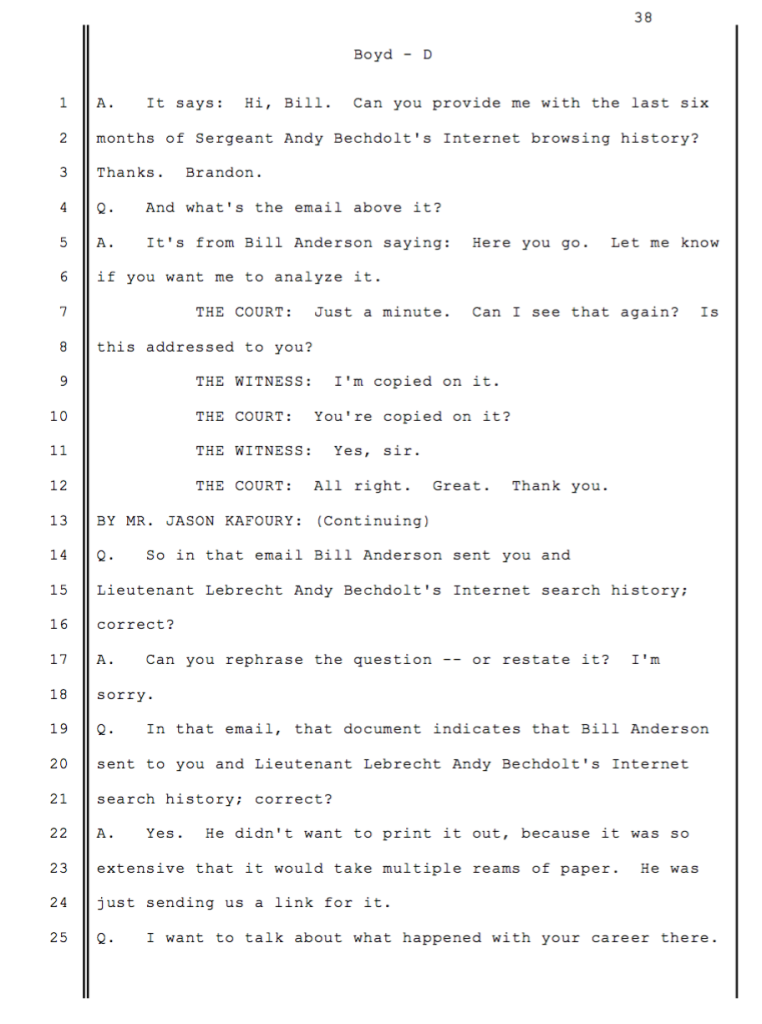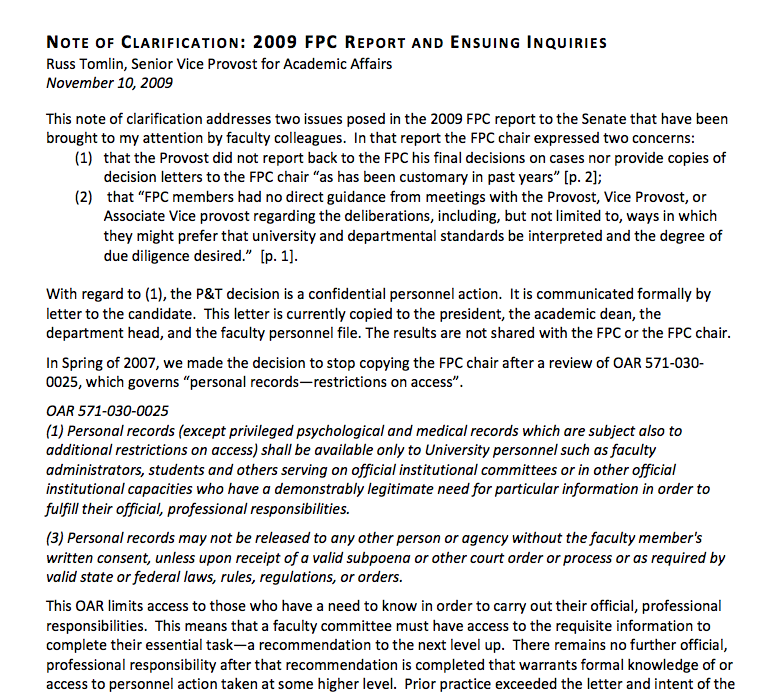10/9/2015: Just some of the questions raised by the Bowl of Dicks trial transcripts.
I’ve never looked at trial transcripts before, but if reading the good work of the Honorable Judge David O. Carter presiding doesn’t restore a little faith in the American judicial system and give you a few laughs along the way then you are a worse cynic than I am.
How did Johnson Hall let the incompetence, harassment, retaliation, and backstabbing revealed in these transcripts go on for years? These people call themselves leaders? How many careers have been ruined on their watch?
Here are the trial transcripts. The docket, here, lists who is testifying on which day.
FINAL-MINI-9-9-15-Carter-CV-1-Trial
FINAL-MINI-9-10-15-Carter-CV-Trial Day 3
FINAL-MINI-9-11-15-Carter-CV-Trial Day 4
FINAL-MINI-9-14-15-Carter-CV-Trial Day 5
FINAL-MINI-9-15-15-Carter-CV-Trial Day 6
FINAL-MINI-9-16-15-Carter-CV-Trial Day 7
FINAL-MINI-9-21-15-Carter-CV-Trial Day 8
FINAL-MINI-9-22-15-Carter-CV-Trial Day 9
FINAL-MINI-9-23-15-Carter-CV-Trial Day 10
FINAL-MINI-9-24-15-Carter-CV-Day 11-1
FINAL-MINI-9-25-15-Carter-CV-Trial Day 12-Verdict
And some excerpts:
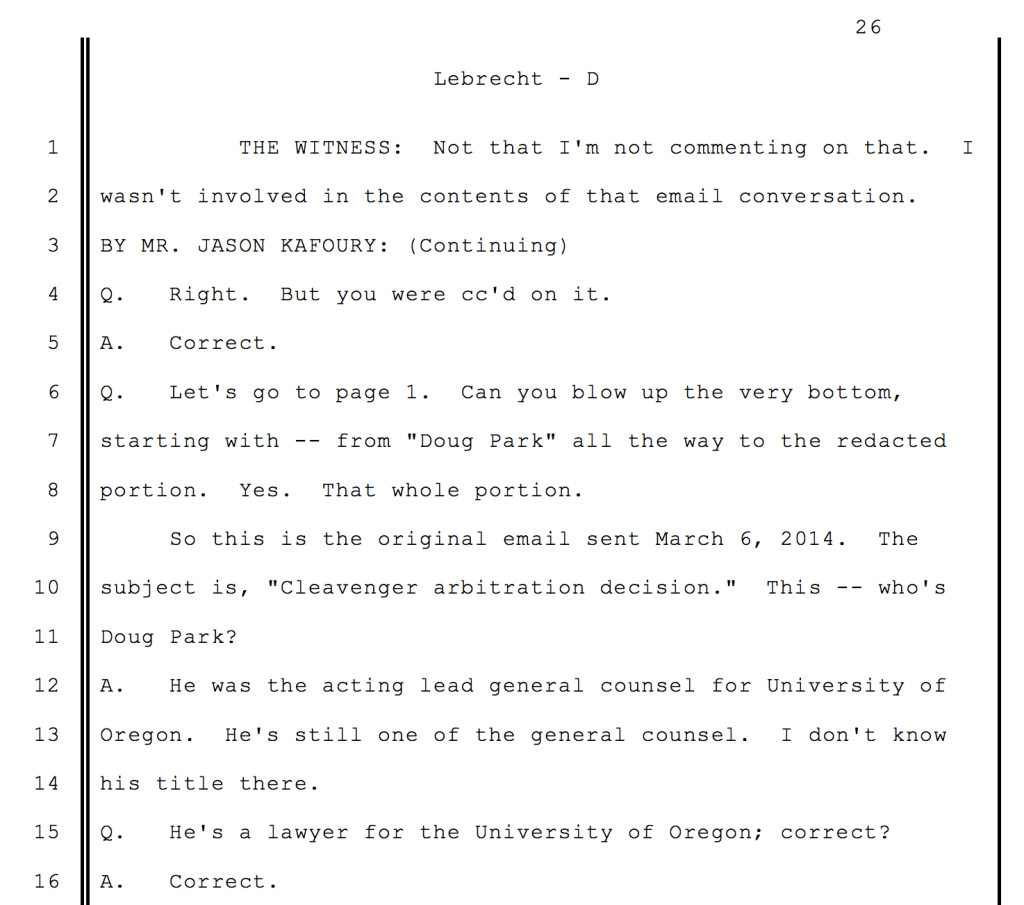
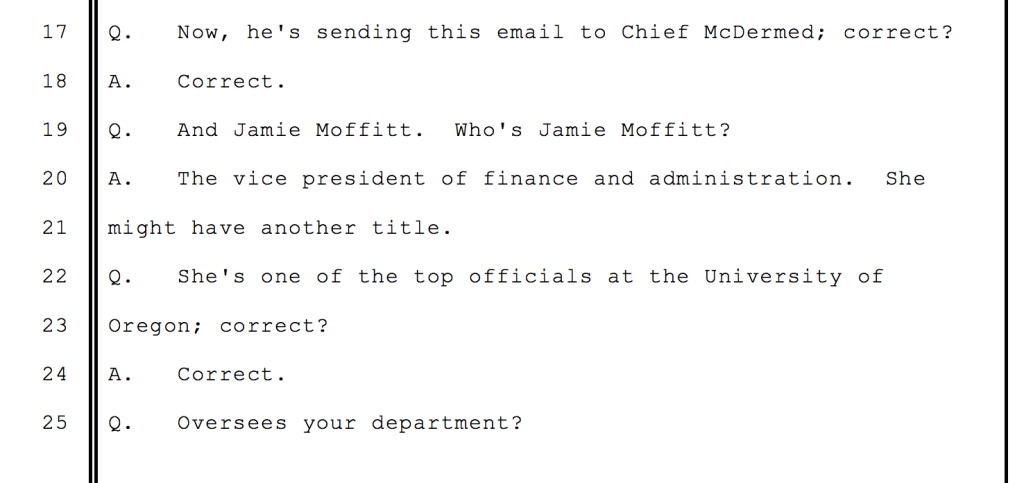
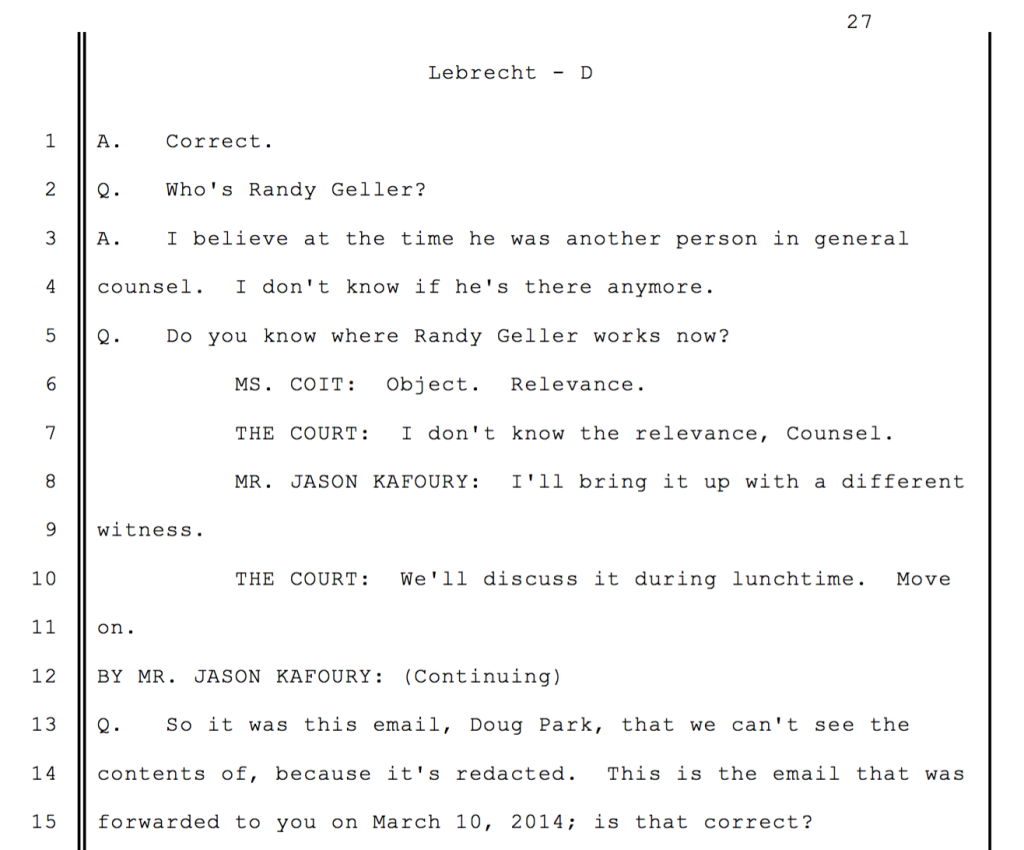
UO General Counsel Randy Geller was fired resigned to spend more time with his family during the midst of the basketball rape allegation cover-up. He now works at HLGR with Andrea Coit. Not hard to imagine why she wouldn’t want the jury to know that.
And was UOPD Chief Carolyn McDermed’s retaliation against former officer James Cleavenger done against the advice and without the knowledge of former UO GC Randy Geller and former interim UO GC Doug Park? Or did the retaliation occur on their advice? With their knowledge? Did they give the full facts to Lane County DA Alex Gardner when he was considering Brady Listing James Cleavenger?
The court wants to know, but as it happens Andrea Coit, the HLGR lawyer, has redacted a key document. Funny how often that happens here at UO, but Judge Carter is not amused:
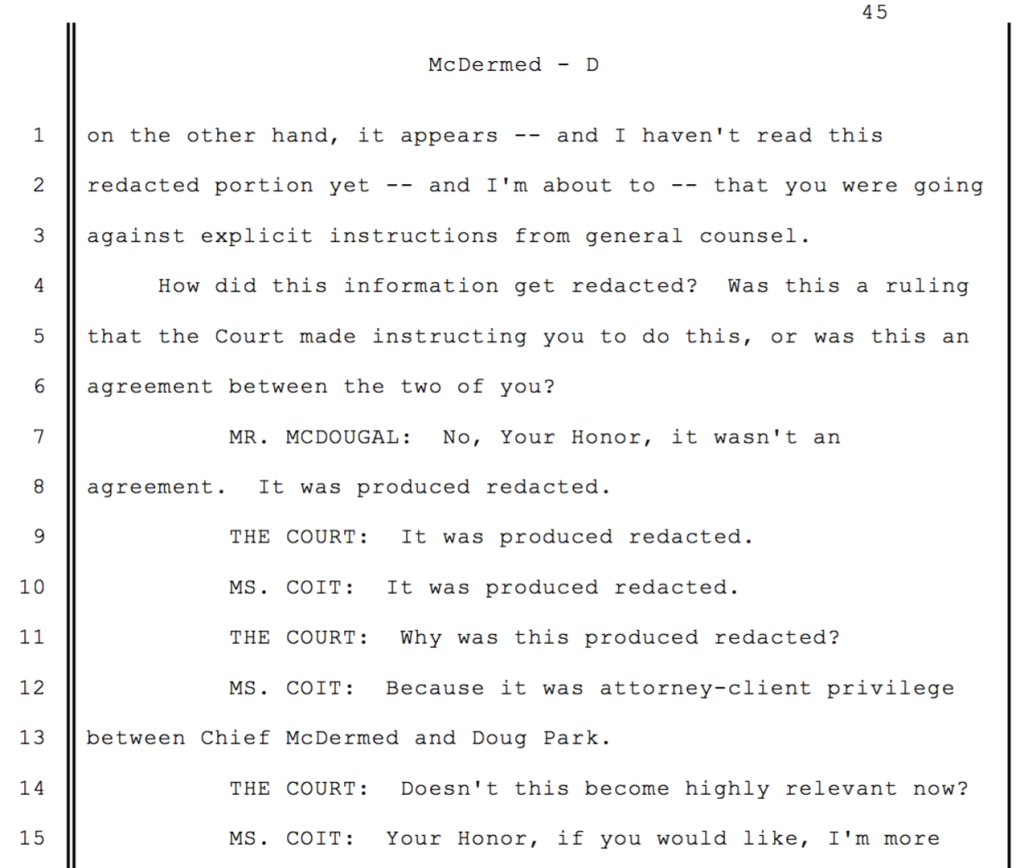
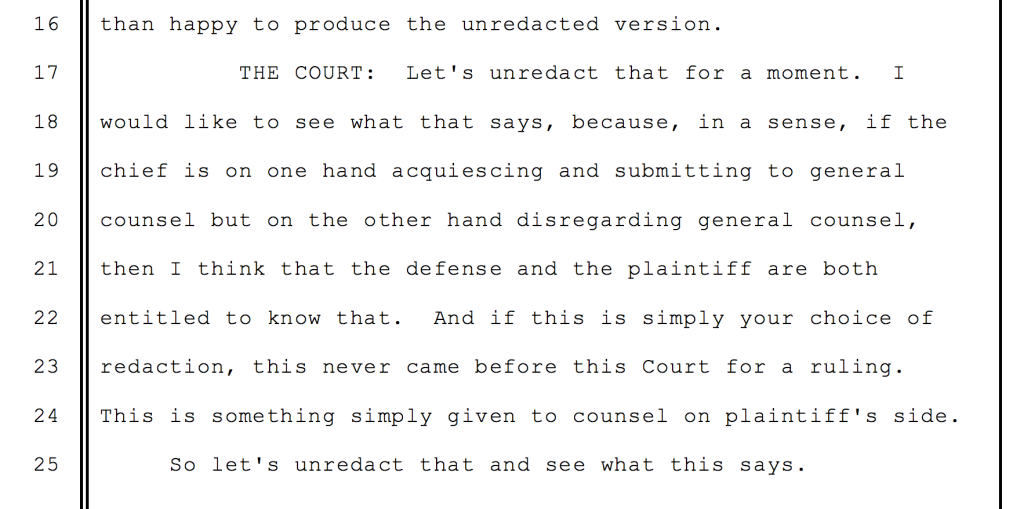
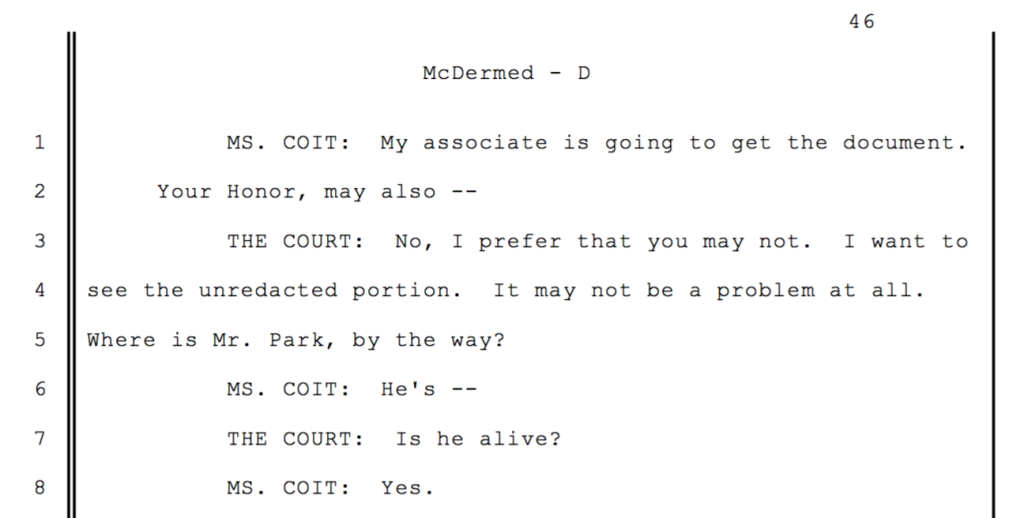
Alive but conveniently not in court, lest Judge Carter haul his ass onto the witness stand and swear him in.
So did Randy Geller and Doug Park know what Chief McDermed was up to with the retaliatory Brady listing? I’ll be damned if I can figure that out from these transcripts. Comments welcome.
9/29/2015: Kafoury and McDougal accuse Doug Park and HLGR of participating in UOPD retaliation against Cleavenger
I don’t know if this would be a violation of the Bar’s ethics rules. From the website of the Kafoury and McDougal law firm that won the Cleavenger case:
Today, a federal jury in Portland awarded $755,000 to James Cleavenger, a former public safety officer at the University of Oregon who claimed retaliation and loss of his law enforcement career at the hands of the University of Oregon Chief of Police and two commanders. The jury found that defendants Chief Carolyn McDermed, Lt. Brandon Lebrecht, and former Sgt. Scott Cameron violated Mr. Cleavenger’s First Amendment free speech rights for speaking out on police policy and matters of public concern, of which his superiors disapproved.
As a University of Oregon law student in 2008, Cleavenger spoke out against arming the University of Oregon officers with tasers without proper training and a use of force policy with input from the campus community. Evidence at the trial showed that defendants resented his comments at the time, were baffled that he was later hired by the department, and the jury found that because of his taser speech this lead to papering his file and terminating him. The jury also found Cleavenger was secretly placed on the Lane County District Attorney’s “Brady List,” a process which blacklists officers found to be “dishonest,” effectively ending an officer’s law enforcement career.
Attorneys including Doug Park, University of Oregon’s Acting General Counsel, participated in the decision to “Brady List” Mr. Cleavenger. The University of Oregon was represented by Andrea Coit of Harrang Long Gary Rudnick P.C. in Eugene, who participated in the efforts to have Cleavenger “Brady Listed.” The decision to “Brady List” Cleavenger came immediately upon the heels of the decision by a neutral arbitrator that Cleavenger’s firing was improper and that he was entitled to reinstatement. The arbitrator further rejected all of the department’s accusations of dishonesty by Cleavenger. Despite the Arbitrator’s decision, UOPD tried to renew these claims of dishonesty by Cleavenger without providing the DA the Arbitrator’s actual decision, in a deliberate attempt to try to block Cleavenger’s reinstatement and in retaliation for Cleavenger filing his lawsuit.
9/25/2015: It’s not about the Bowl of Dicks: Jury awards Cleavenger $650K+$105K punitive damages
It’s about the UOPD’s retaliation against him for exercising his 1st Amendment rights. He’d only asked for $400K.
Testimony showed UO’s Interim GC Doug Park was also involved in Cleavenger’s firing and knew about the UOPD’s retaliation efforts though he was not a defendant. Cleavenger has another case against UO pending in state court. The Oregonian’s Betsy Hammond elaborates on the involvement of Park and others, in the comments on her story on the verdict:
There was extensive testimony and documentary evidence about the role that Linda King, Brian Smith, Doug Park and others played in giving the officer written notice spelling out why he was going to be fired, in holding meetings and hearing on his discipline, in putting written materials into his file, etc. Chief McDermed testified she ran the Brady listing plans past Doug Park.
No info yet on how much Andrea Coit and Jonathan Hood will earn from losing this case, but HLGR typically charges ~$300 an hour. That’s a lot for lawyers who manage to lose a case so badly the jury awards more than the plaintiff asked for.
While UO claimed that insurance would pay for the lawyers and damages, that does not appear to be true – we’re in the PURMIT risk pool with the other state universities.
The report from Betsy Hammond is in the Oregonian here. A snippet:
“This is a victory for every honest police officer,” said Jason Kafoury, Cleavenger’s lead lawyer. “The jury today honored and enforced an officer’s right to speak freely on matters of public concern, regardless of whether their superiors approve.”
University of Oregon spokesman Tobin Klinger said Friday morning he needed additional time to provide the university’s perspective on the legal defeat.
Actually, Duck Advocate Tobin Klinger’s perspective on this First Amendment case is already on the record, in a letter to the editor he sent to the RG shortly after getting hired by UO for $115K to manage relations with the press and reading Diane Dietz’s July 11th 2014 story on the Bowl:
Story aimed for shock value
I’m a recent transplant to Eugene, having spent a majority of my adult and professional life working with media in northwest Ohio.
Like many, I idealized life in the Pacific Northwest. Eugene and its people have lived up to my vision. Eugene is access to independent film, unique foods, outdoor activities, cultural happenings and community pride.
I don’t know that this shines through on the pages of The Register-Guard, particularly with the sophomoric “reporting” of Diane Dietz.
I admit to having a bias. Dietz covers my employer, the University of Oregon. In my role as head of UO public affairs communications, it is my job to defend the integrity and the reputation of the university. I advocate for faculty, staff, students, administration and athletics. I advocate for the Ducks.
Earning positive attention is a challenge with a reporter who is more interested in pandering to the lowest common denominator than demonstrating the value of higher education. Where else would you see the phrase “bowl of —–” five times in a single news article (Register-Guard, July 11)? This obvious play for shock value diverted attention away from the fact that the reporter waited 26 paragraphs before sharing important details from the university.
Moreover, this same newspaper in February dedicated significant space to a major Sunday story that used a blatant stereotype of Chinese students as its primary theme.
Even though I’m new here, I’m certain this community deserves better.
Tobin Klinger, Senior director Public Affairs Communications, University of Oregon, Eugene
So it’s not exactly a mystery why UO’s relationship with the press has gone from bad to worse under Klinger. The First Amendment is our lowest common denominator? Continuing with Hammond’s report:
The jurors found McDermed violated Cleavenger’s First Amendment rights when she fired him in 2012, then again in 2014 when she and Lebrecht created a huge, potentially career-ending dossier designed to prove Cleavenger was too untruthful to testify in court.
Jurors ironically decided that it was McDermed who most likely lied under oath when she testified that she ordered creation of that dossier because she was worried Clevenger was a danger to himself and other officers, not because he complained to her superiors and filed a lawsuit that made her and her department a national laughingstock.
And then:
The UO’s top lawyers and human resources officials were intimately involved in the decision to fire Cleavenger, and McDermed testified Douglas Park, then UO’s No. 2 in-house lawyer, knew she was going to try to get Cleavenger on the Brady list. Since then, Park was promoted on an interim basis to UO’s top interim lawyer, but he is slated to return to the No. 2 job when a permanent successor takes over in about a week.
Kafoury said, “It’s a disgrace that the attorneys for the university were in on the decision to Brady list and ruin Clevenger’s career” while defending UO against a lawsuit alleging retribution for whistleblowing.
And then:
Cleavenger also brought to light the department’s petty, vindictive management style and the lack of professional training and record-keeping. Although he had been UO’s most productive safety officer, McDermed eventually ordered Cleavenger, via an intermediary, not to report any crimes except felonies – an order that appears to violate a high-profile federal campus safety law.
The verdict is in:
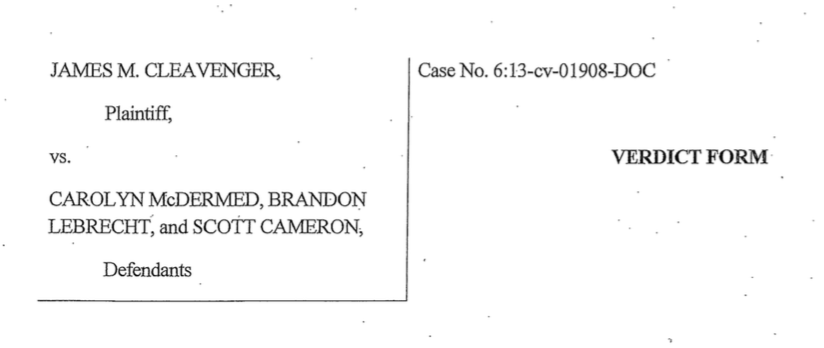
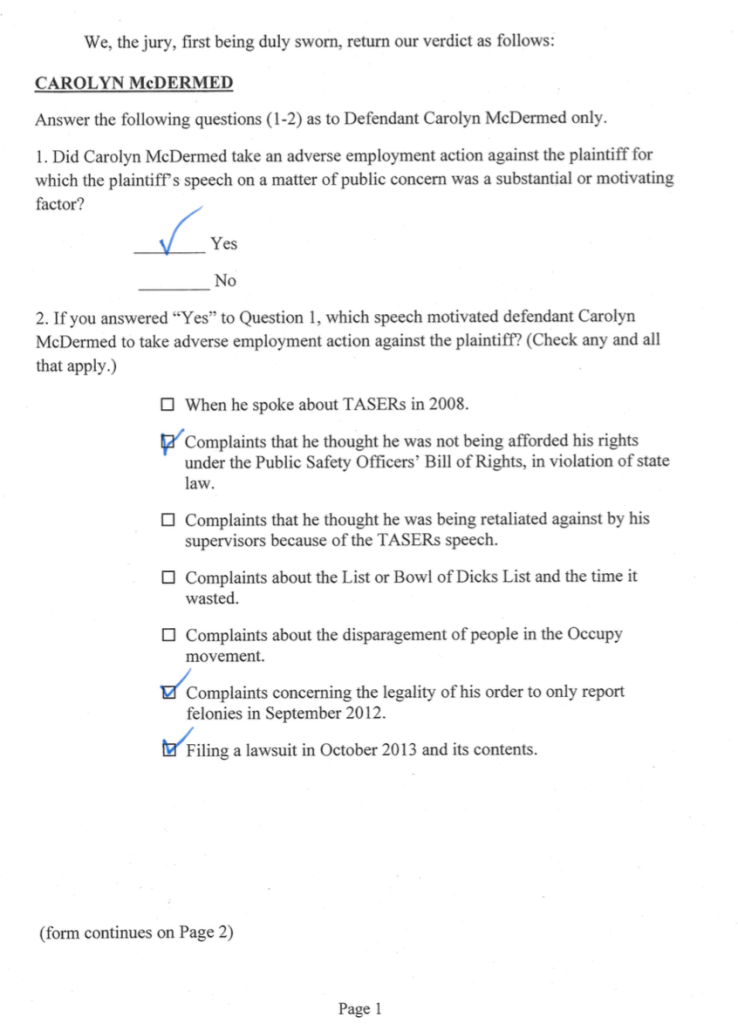
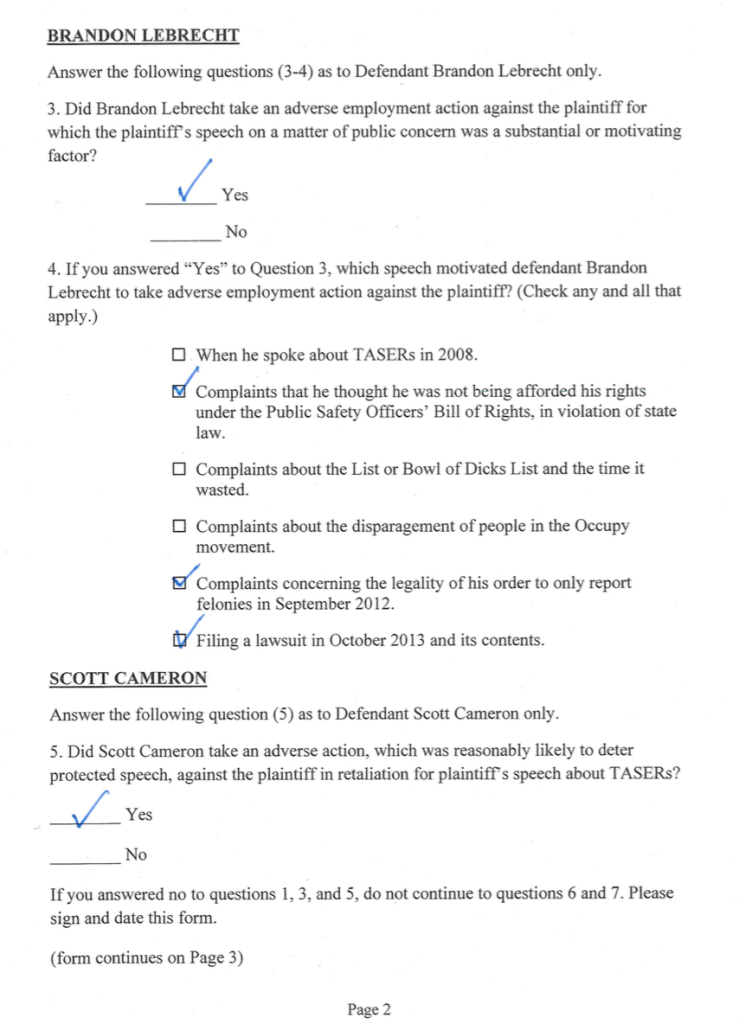
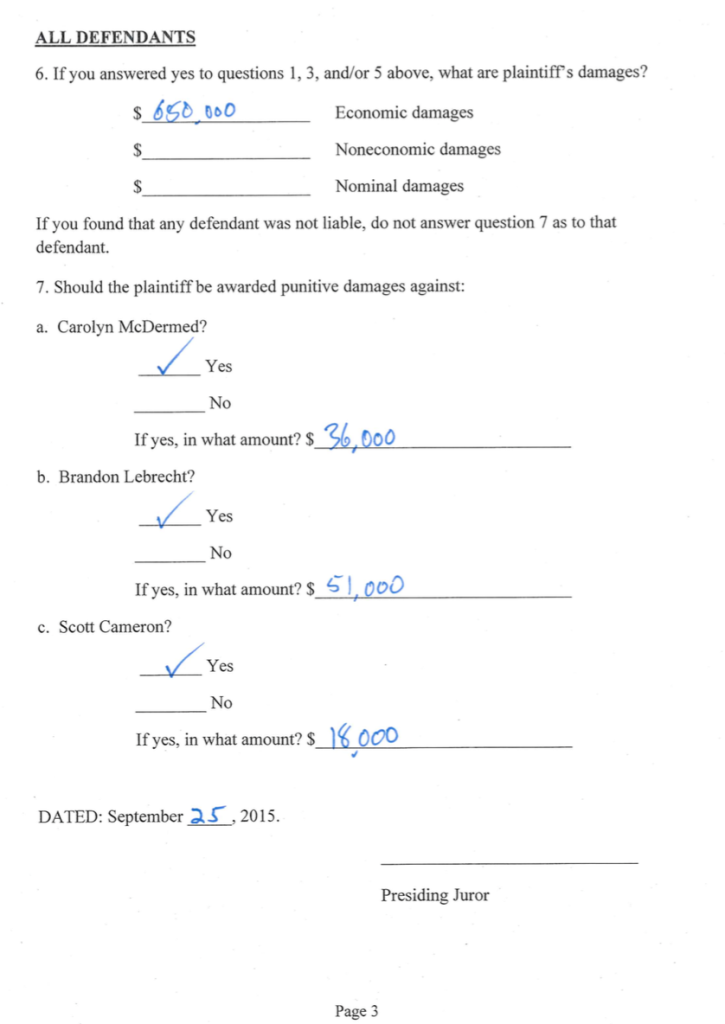
9/24/2015: Harrang lawyers claim Bowl of Dicks not “a matter of public concern”, judge disagrees
The Honorable David O. Carter must have an art history degree. He rejected HLGR’s last minute plea, apparently without snickering, and the jury is now deliberating. Docket here.
9/23/2015: HLGR lawyers claim Bowl of Dicks not “a matter of public concern”
That’s what they want the judge to tell the jurors when they get the case in the next day or two. The complaint from UO’s HLGR lawyers about the judge’s proposed jury instructions is below.
Given the large public response to the press coverage of this case – Tobin Klinger chimed in too – this argument ignores the foundation of modern economics, Paul Samuelson’s Weak Axiom of Revealed Preference. It also contradicts the “De gustibus non est disputandum” work of two other Nobel Prize winners, George Stigler and Gary Becker.
So maybe HLGR’s lawyers majored in literature, not economics? It’s news to me, but wikipedia says that the modern meaning of the phrase comes from Fyodor Dostoyevsky. OK, so not every lit major makes it through The Brothers Karamazov.
Or maybe they were Art History majors? Apparently not. One of the most celebrated works of famed Renaissance artist Francisco Urbini is, yes, a Bowl of Dicks. The BBC – how’s that for classy – has the report here.
Sorry, but the public is plenty interested in the bowl, dicks, and the First Amendment and retaliation issues the combination has raised, as Diane Dietz explains very well in the RG, here.
The BBC:

Yes, I bet it was. Probably a lawyer. The great thing about great art is its timeless relevance to our daily lives.
Here’s HLGR’s plea to the judge for a change in the jury instructions:












